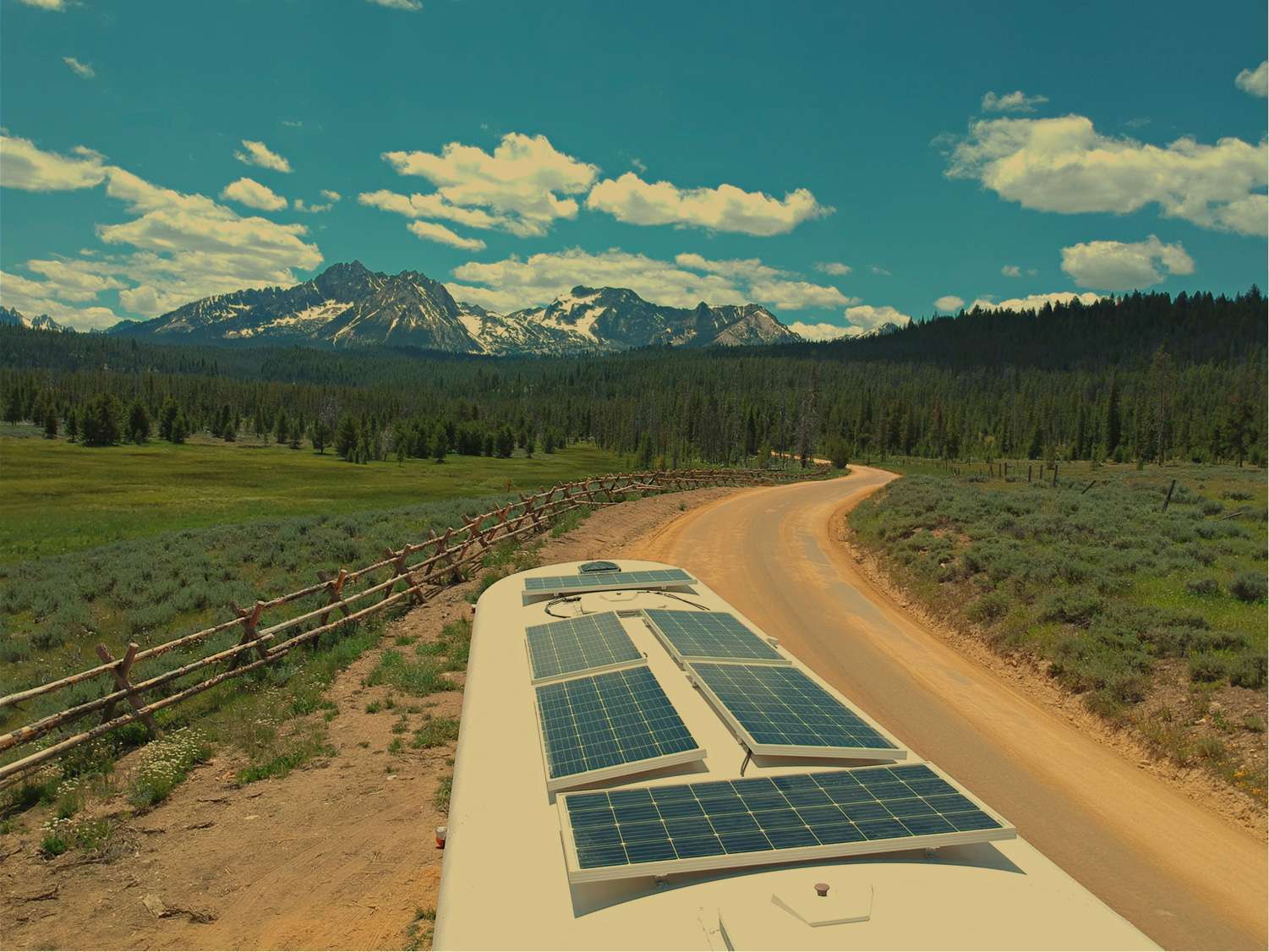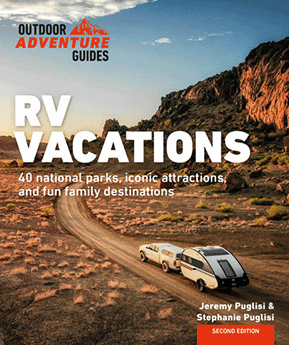Whether you’re a new or experienced RVer, adding a solar power system to your RV can seriously expand your camping options. When you first begin researching, it seems like there’s a lot to learn. However, we’re going to explore some RV solar power options from Go Power! to make it easier to find a setup that fits your needs.
Jake Erwin, a sales representative for the RV team at Go Power! is going to explain eight RV solar power system options appropriate for a variety of RVs and use cases. Finding your perfect system involves considering your power needs, your rig, your camping style, and of course–your budget.
Go Power! is just one of many RV solar system provides, but Go Power! is more than just a product. The support is second to none, with a small team of dedicated professionals operating behind the scenes. When you get a system from Go Power!, you’re getting real-live support from real-live humans!
Our family has had solar systems on and off through the years. We currently don’t, and we miss the convenience, especially when we consider those amazing boondocking, Harvest Hosts, and state park sites without electric hookups. So, as we talk about these great solar power systems, we are also considering what would best fit our own needs.
The Benefits of Adding or Upgrading a RV Solar Power System
According to Jake, there are several benefits to adding or upgrading a solar power system:
- Savings: Despite the upfront cost, in the long run, a solar power system can save you money. One way it does this is by expanding the life span of your batteries. Another plus is that you may not even need to hook up to shore power when your RV is parked at home, as your solar system can keep your batteries charged.
- Opportunities for Camping: You’ll have more camping options–and less expensive ones. You can go off the grid, find free camping sites, utilize services like Harvest Hosts, and camp at national and state parks.
- Peace and Quiet: If you’ve been using a generator for off-grid power, you’ll really appreciate how quiet solar power is.
RV Solar Power Systems: Battery Options
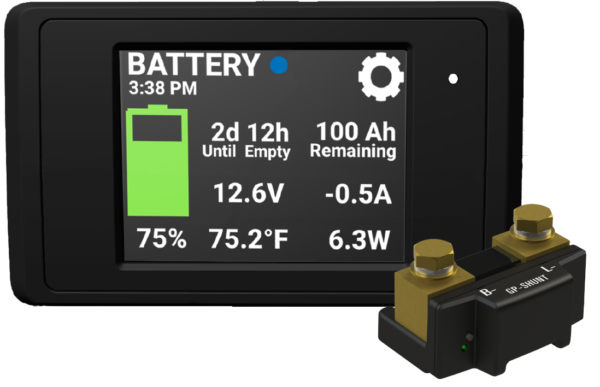
First, let’s talk batteries. Whether you use solar or electric to generate power, the battery is where the power is ultimately stored. When shopping for a mobile power solution, it’s good to decide which type of battery you prefer first. There are a lot of pros and cons to each type to consider:
- Traditional Flooded-Acid Batteries: These are low cost, predictable, and found pretty much everywhere. They have been the traditional choice for so long. On the downside, they have a short life. If you aren’t taking proper care of them, they may only last a couple of years. Also, they vent a toxic gas, so you can’t store them inside. Next, they are susceptible to freezing, which kills their life span. Finally, they are heavy.
- AGM (Absorbed Glass Mat) Batteries: These are a newer option. They uses the same basic setup at the flooded-acid batteries, but since they are properly sealed, they can be stored inside, which frees up storage space on your tongue and allows you to build a bigger system. Sealed systems require less maintenance and do not freeze. Finally, they are less experience than the lithium options. However, they are quite heavy, like traditional batteries.
- Lithium-ion Batteries: These are the newest battery option. A major benefit is their weight. They may weight half as much as their AGM comparisons. They also offer double the useable power capacity since you can run them down to 0% charge remaining without worrying about damaging the battery. If you have a 100-amp hour battery of each type, the lithium will run twice as long since you need to charge the AGM once it hits around 50%. Plus, they last longer. Finally, they are safer thanks to their stability and their built-in safety systems. They do have two drawbacks. One is the lack of performance in cold temperatures–they shut down below freezing. However, advanced lithium batteries come with a built-in heating systems to help offset this problem. The other drawback to lithium batteries is the cost. They are more expensive.
To hear Jake and Jeremy explain more about each battery option, make sure to check out the full audio podcast by clicking play on the media player above or by searching for The RV Atlas wherever you find your favorite podcasts.
Now, let’s take a look at eight solar power kit options from Go Power! To fully explore the specs on each and to learn more about the pricing and battery options, make sure to head to the Go Power! website and to listen to the podcast episode paired with this post.
OPTION 1: Duralite Portable Solar Kit
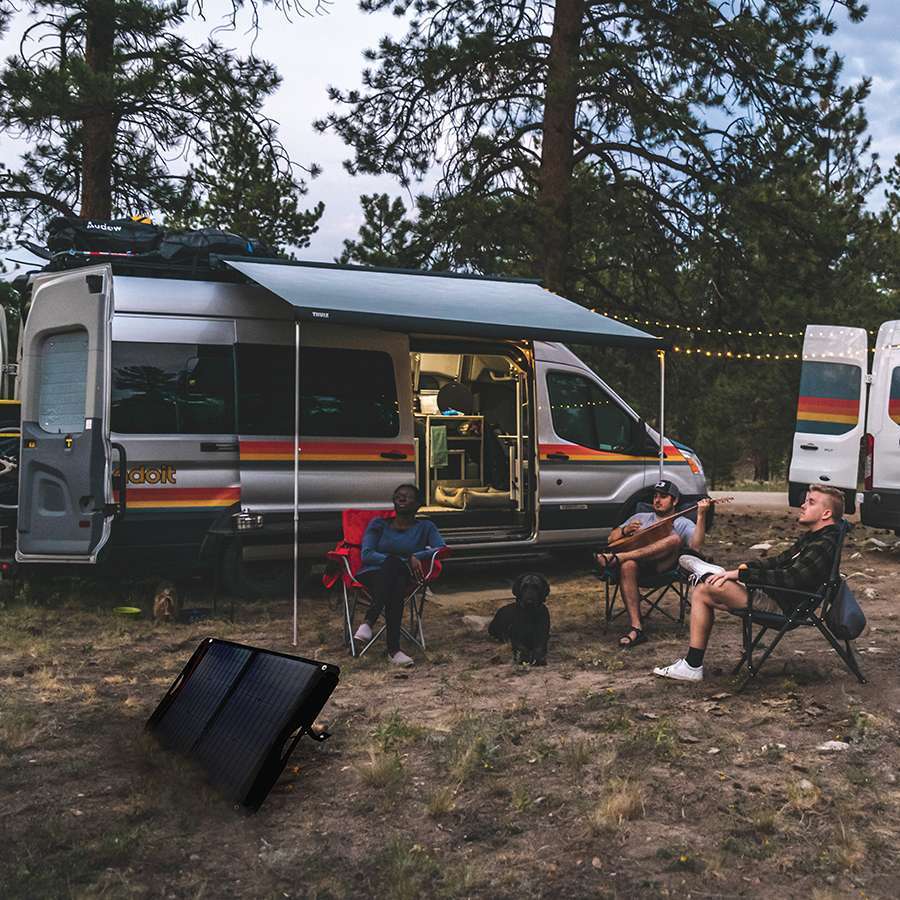
The Duralite Portable Solar Kit is a super lightweight, portable option, weighing in at approximately 10 pounds. Despite its light weight, it packs a powerful punch, offering 100 watts. You can add expansion panels, as well. This is a great entry point, and it’s perfect for overlanders, tent campers, and van life folks. Pricing comes in under $600.
OPTION 2: Overlander Solar Charging Kit
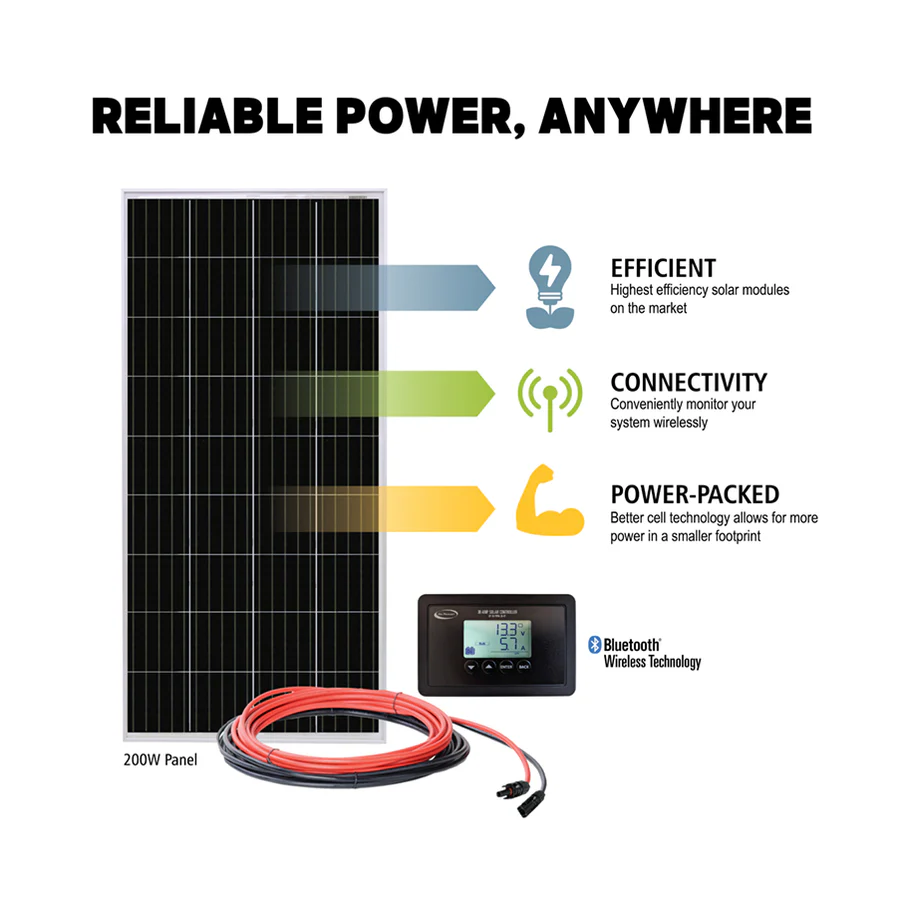
According to Go Power!, the Overlander Solar Charging Kit is the “largest single 12-volt solar charging kit on the market, with 200 watts and 9.6 amps of power charging capability.” This has been a long-selling classic kit that’s been updated over the years. It’s one of the most popular options! The 200-watt panel is rugged and durable and holds up well on the road. It produces 10 amps of charge per hour per panel and can be upgraded if your needs expand. Expect to pay around $650 for this kit minus the batteries.
OPTION 3: Weekender ISW Solar Charging Kit

While the other options we’ve looked at so far focused on providing the solar panel and basic accessories, the Weekender ISW Solar Charging Kit is more of a full power system, meaning it comes with a 1500-watt inverter and a transfer switch. The inverter pulls 12-volt power from the batteries and converts it to standard 110-volt power that’s used to run your various appliances. As its name implies, this kit can take you off the grid for the weekend and should tackle most, if not all, of your needs! You’re looking at a $2000 price tag plus your batteries.
OPTION 4: Solar Elite Charging Kit
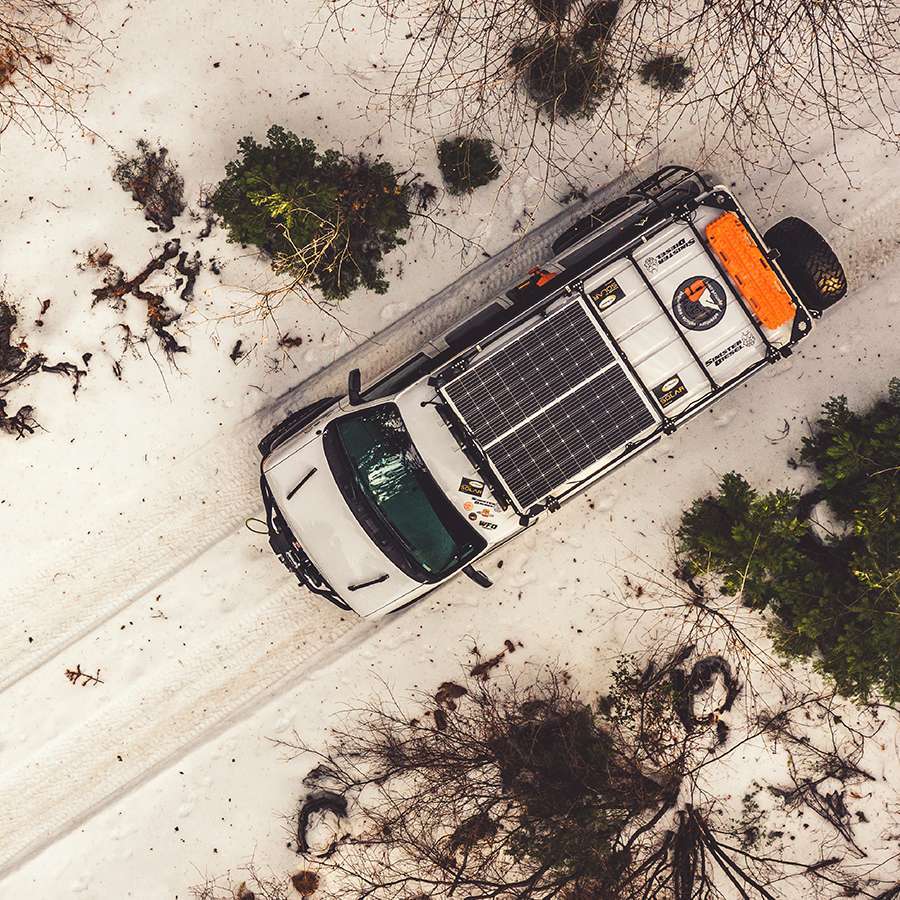
What if you want to camp for more days or have higher power needs? The Solar Elite Charging Kit is the next step up from the Weekender. According to Go Power!, this system includes a “2000 watt Inverter Charger, a supreme all-in-one unit that combines 2000 watts of pure sine wave AC power with a built-in battery charger and transfer switch.” It can run pretty much everything in your rig. To get this level of power, expect to pay around $3000 plus the battery costs.
OPTION 5: Solar Extreme Charging Kit
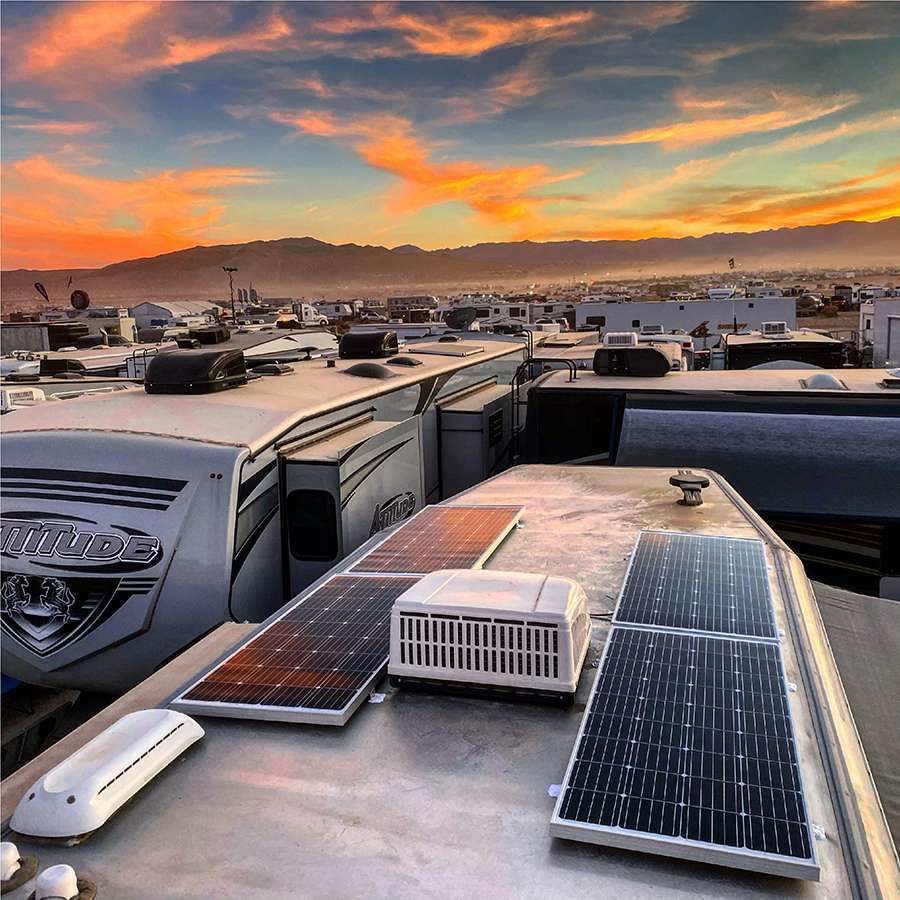
As its name implies, the Solar Extreme Charging Kit is made for someone with extreme power needs (including AC, if you have a proper battery setup). To compare this to a car engine, this would be your V8. This system can run 3000 watts of electricity, while also charging your batteries. Expect to pay upwards of $4000.
OPTIONS 6,7,8: PowerTrak Solar
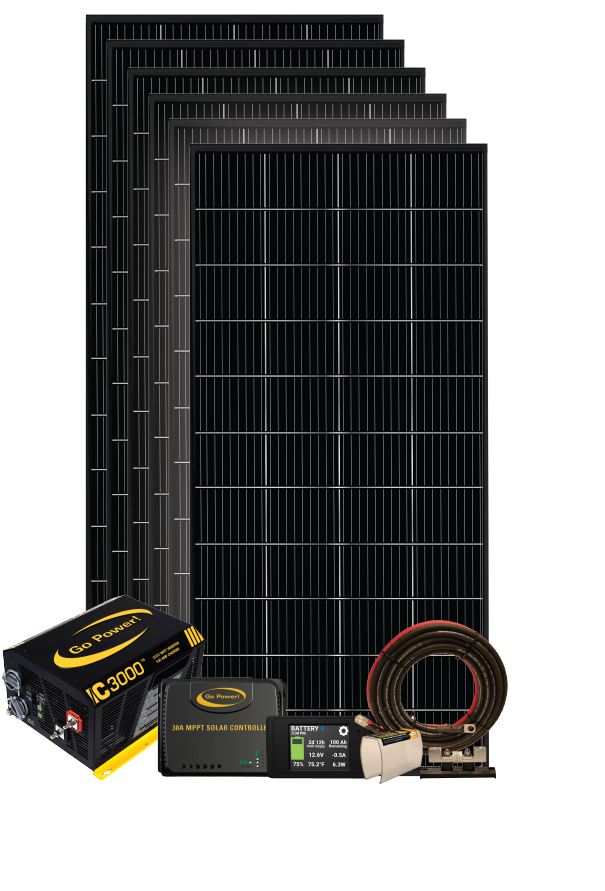
Go Power! is continually researching and developing new options. Currently, the cutting-edge technology is found in the Go Power! PowerTrak solar systems. These are designed to be complete RV power packages, including powerful panels, a 3000-watt inverter, and upgraded solar controllers. Go Power! has 3 of these all-new options:
These systems feature the latest and greatest options for operating your system, including a smart touch-screen display that integrates with all of the parts, making it easy to monitor and control everything. Plus, they offer a major boost in capabilities. Expect to pay $4000-$6000 plus.
How to Find Out More about RV Solar Power
To hear Jake and Jeremy explain more about each of these RV solar system options, make sure to check out the full audio podcast by clicking play on the media player above or by searching for The RV Atlas wherever you find your favorite podcasts.
We hope this helps you begin to understand the world of RV solar power! We know it’s complicated, but these kits from Go Power! are designed to make it easier. Go Power! partners with websites, dealers, and manufacturers across the nation, making it easy to find their products and to learn more about them.
Finally, make sure to check out the resources page on the Go Power! website and YouTube channel. You may also look for Jake and the Go Power! crew at upcoming RV and overlanding shows across the U.S. Bring your questions! Check out the demo displays!
All images are from the Go Power! website.

